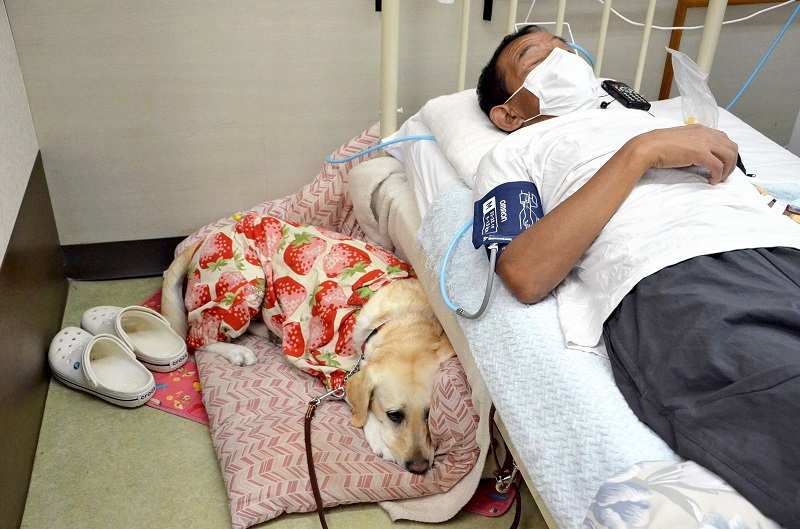
Norun, a guide dog, sits quietly on the floor while its owner, Naoki Tsuchiya, receives dialysis treatment in Kisarazu, Chiba Prefecture.
20:00 JST, October 22, 2022
Cases still exist in which physically impaired people with assistance dogs are refused entry to public facilities, public transportation and hospitals, even though this year marks the 20th anniversary of the enactment of a law that obliges public transport and facilities to allow entrance to assistance dogs.
The Assistance Dogs for Physically Disabled Persons Law obliges operators of such facilities to allow assistance dogs to enter if they are accompanying disabled people.
However, the fact that many assistance dogs have been refused entry indicates that more work needs to be done on making the roles of such dogs widely recognized by the public.
Isao Tanabe, 68, who lives in Maebashi and is visually impaired, was once refused entry into a dental clinic together with his assistance dog, Dipushi. Tanabe was told that the facility was worried about sanitation issues and they wanted the dog to wait outside.
Tanabe consulted the city government and other authorities and, as a result, the clinic allowed him and Dipushi to enter an examination room together.
However, he has also been refused entry into a taxi and an eatery together with his guide dog.
“I want to participate in society unhindered even though I’m with a guide dog,” he said.
The Japan Guide Dog Association conducted a survey in 2021 on 215 guide dog users. The results showed that one out of three people had been denied entry to public places while being accompanied by their guide dog.
Owners are obliged to control their assistance dog’s sanitation conditions and actions.
However, among the reasons for denying entry were erroneous perceptions. For example, one person was told that a guide dog’s dirty paws have a high risk of transmitting the coronavirus.
There are medical institutions that accept assistance dogs as the norm.
Naoki Tsuchiya, 56, hails from Kisarazu, Chiba Prefecture. Tsuchiya went to Kisarazu Clinic in the city together with his guide dog, Norun, to get dialysis in late September.
Tsuchiya proceeded to a dialysis treatment room on the second floor with Norun and put a mat and cushion on the floor beside the bed for the dog to lie on during his treatment, which lasted about five hours.
“[The dog] stayed quiet and didn’t burden the facility at all,” a chief nurse at the clinic said.
The clinic began accepting guide dogs accompanying their owners in 2004. Because there are patients who dislike dogs, the clinic takes several measures. For example, the then director of the clinic explained to other patients that sanitation controls would be thoroughly taken, and patients who disliked dogs would not be placed in beds nearby.
According to the Health, Labor and Welfare Ministry, there were 848 guide dogs as of April. The total number of assistance dogs — which includes hearing dogs and service dogs in addition to guide dogs — was 969.
Top Articles in Society
-

Producer Behind Pop Group XG Arrested for Cocaine Possession
-

Man Infected with Measles Reportedly Dined at Restaurant in Tokyo Station
-

Man Infected with Measles May Have Come in Contact with Many People in Tokyo, Went to Store, Restaurant Around When Symptoms Emerged
-

Woman with Measles Visited Hospital in Tokyo Multiple Times Before Being Diagnosed with Disease
-

Australian Woman Dies After Mishap on Ski Lift in Nagano Prefecture
JN ACCESS RANKING
-

Producer Behind Pop Group XG Arrested for Cocaine Possession
-

Japan PM Takaichi’s Cabinet Resigns en Masse
-

Man Infected with Measles Reportedly Dined at Restaurant in Tokyo Station
-

Israeli Ambassador to Japan Speaks about Japan’s Role in the Reconstruction of Gaza
-

Videos Plagiarized, Reposted with False Subtitles Claiming ‘Ryukyu Belongs to China’; Anti-China False Information Also Posted in Japan



















